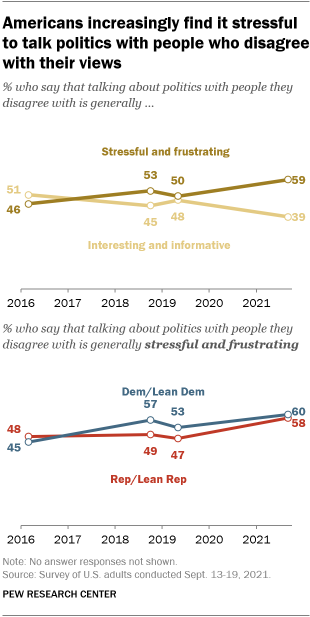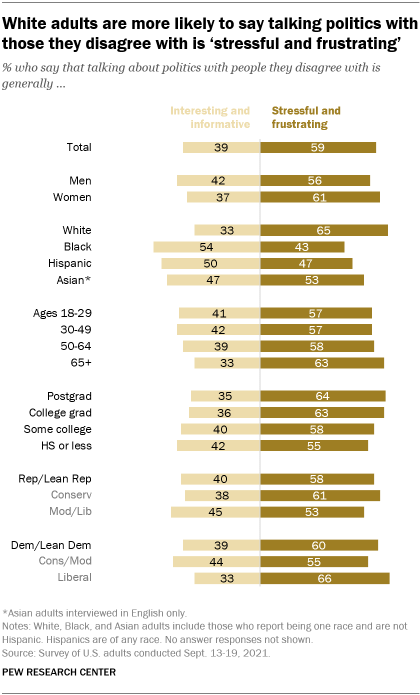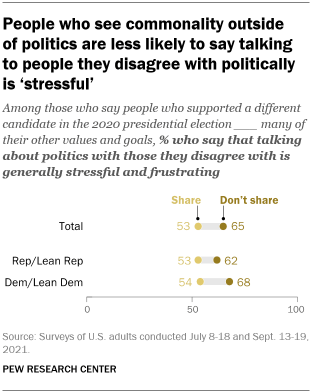The share of Americans who say having political conversations with those they disagree with is “stressful and frustrating” has increased in recent years. Nearly six-in-ten U.S. adults (59%) say they find these conversations stressful, up from 50% in May 2019, according to a Pew Research Center survey conducted in mid-September.
Pew Research Center conducted this analysis to understand the public’s views on having political conversations with people they usually disagree. For this analysis, we surveyed 10,371 U.S. adults in September 2021. Everyone who took part in this survey is a member of the Center’s American Trends Panel (ATP), an online survey panel that is recruited through national, random sampling of residential addresses. This way nearly all U.S. adults have a chance of selection. The survey is weighted to be representative of the U.S. adult population by gender, race, ethnicity, partisan affiliation, education and other categories. Read more about the ATP’s methodology.
Here are the questions used for the report, along with responses, and its methodology.
This increase has come among Republicans and Democrats alike. Today, 58% of Republicans and Republican-leaning independents say they find talking politics with people they disagree with to be stressful, up 11 percentage points since 2019.
Similarly, six-in-ten Democrats and Democratic leaners say they find such conversations stressful and frustrating, up from 53% in 2019.
In March 2016, about half of Republicans (48%) and 45% of Democrats said political conversations with those they disagree with were stressful and frustrating.
Nearly two-thirds of White adults (65%) say they find talking about politics with people they disagree with to be stressful – much higher than the shares of Black (43%), Hispanic (47%) and Asian (53%) adults who say this.
Those under the age of 50 (57%) are slightly less likely to find such conversations to be stressful and frustrating than those 50 and older (61%).
While nearly equal shares of Republicans (58%) and Democrats (60%) say discussing politics with those they disagree with is stressful, the more moderate members of each party are less likely to find such conversations stressful.
About six-in-ten conservative Republicans and Republican-leaning independents (61%) find these conversations stressful compared with about half of moderate and liberal Republicans (53%).
Two-thirds of liberal Democrats and Democratic-leaning independents find such conversations stressful. By comparison, a smaller majority (55%) of conservative and moderate Democrats feel this way.
Americans who say people who supported a different candidate than they did in the 2020 presidential election still probably share their other values and goals are less likely to find conversations with those they politically disagree with stressful and frustrating than those who do not see these commonalities.
About two-thirds of Americans (65%) who say people who supported a different candidate in 2020 probably don’t share their other values say they find talking politics with those who disagree with them to be stressful. A smaller share – about half (53%) – of those who say political opponents largely do share their other values say this. This pattern holds for both Republicans and Democrats.
Note: Here are the questions used for the report, along with responses, and its methodology.



